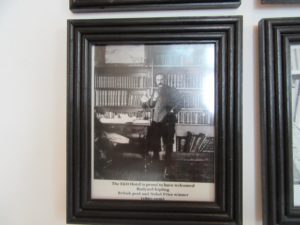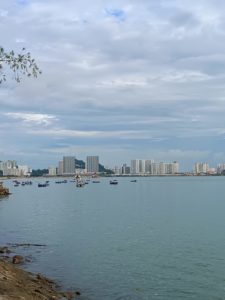 Older readers in Shillong will recollect devouring Maugham’s short stories, I am certain most of them cannot even recount how many times they must have read and reread the tales dealing with the lives of British and other colonial expatriates in South Asia, invariably Europeans, planters, colonial officials, businessmen, or just men living in exile to escape from trouble or sadness at home, conveying the emotional toll that isolation extracts from his characters. Despite an unpronounceable last name, this greatly popular English writer, famous for his plays, novels and short stories continues to remain a favorite in literary circles today. Readers of my age group are great fans of the author. Best known for gathering material for his fiction during his South-Asian visits, studying people and places and using them with minimal alteration or disguise, Maugham’s stories of Singapore and the Malay Peninsula has several devoted readers hooked to his tales of fiction.
Older readers in Shillong will recollect devouring Maugham’s short stories, I am certain most of them cannot even recount how many times they must have read and reread the tales dealing with the lives of British and other colonial expatriates in South Asia, invariably Europeans, planters, colonial officials, businessmen, or just men living in exile to escape from trouble or sadness at home, conveying the emotional toll that isolation extracts from his characters. Despite an unpronounceable last name, this greatly popular English writer, famous for his plays, novels and short stories continues to remain a favorite in literary circles today. Readers of my age group are great fans of the author. Best known for gathering material for his fiction during his South-Asian visits, studying people and places and using them with minimal alteration or disguise, Maugham’s stories of Singapore and the Malay Peninsula has several devoted readers hooked to his tales of fiction.
 Malaysia was Maugham’s canvas for collecting and putting together material for his stories during his overseas sojourns, staying in clubs and hotels at Ipoh and Penang. He was known to vividly capture colonial life at the heyday of alcohol-imbibing planters sipping whiskey- stengahs, a drink popular among British subjects in the British Empire in Asia, derived from ‘setengah’, the Malay word for ‘half’ and gin pahits (bitter), drinks mentioned in several Maugham stories, common in clubs and hotel bars of Malay of those times. I was very keen on tracing Maugham’s sojourns through Malaysia and collecting memorabilia associated with him. Sadly, today’s barmen haven’t heard of Maugham or ‘gin pahit’, forcing me to concoct a mix of ‘Pink Gin and Angostura bitters’ and prepare a ‘Gin Pahit’ of those times myself. Today, one must enjoy this concoction and commemorate Maugham’s memory all by oneself!
Malaysia was Maugham’s canvas for collecting and putting together material for his stories during his overseas sojourns, staying in clubs and hotels at Ipoh and Penang. He was known to vividly capture colonial life at the heyday of alcohol-imbibing planters sipping whiskey- stengahs, a drink popular among British subjects in the British Empire in Asia, derived from ‘setengah’, the Malay word for ‘half’ and gin pahits (bitter), drinks mentioned in several Maugham stories, common in clubs and hotel bars of Malay of those times. I was very keen on tracing Maugham’s sojourns through Malaysia and collecting memorabilia associated with him. Sadly, today’s barmen haven’t heard of Maugham or ‘gin pahit’, forcing me to concoct a mix of ‘Pink Gin and Angostura bitters’ and prepare a ‘Gin Pahit’ of those times myself. Today, one must enjoy this concoction and commemorate Maugham’s memory all by oneself!
 An iconic hotel where Somerset Maugham stayed whenever in Penang is the Eastern and Oriental Hotel, known as the ‘E&O’ to Maugham’s generation of travelers. The hotel’s passageways today weave stories of acclaimed writers arriving in steamships to experience the exotic East. I thoroughly searched for Maugham’s favourite room in which he invariably stayed, alas nobody could help me locate that room.
An iconic hotel where Somerset Maugham stayed whenever in Penang is the Eastern and Oriental Hotel, known as the ‘E&O’ to Maugham’s generation of travelers. The hotel’s passageways today weave stories of acclaimed writers arriving in steamships to experience the exotic East. I thoroughly searched for Maugham’s favourite room in which he invariably stayed, alas nobody could help me locate that room.
Fortunately, train journeys across the Malaysian countryside continue portraying the very same landscapes filled with screeching wild monkeys, fragrant frangipani flowers, and whispering casuarina trees bringing back the lifestyle and idiosyncrasies of the colonialists fictionalised by Maugham, basically ordinary people who lived in Malaysian plantations, who played tennis, went to a club, to drink, to take a lunch break, and to play billiards and  bridge. Good, decent, normal people with their little tiffs, jealousies, flirtations, and celebrations!
bridge. Good, decent, normal people with their little tiffs, jealousies, flirtations, and celebrations!
What could explain the diminished state of Maugham’s contribution in the cultural landscape today? Why is it that traditional literary figures lack the same visibility as today’s authors? Is the content of Somerset Maugham’s stories of yore responsible for this state of affairs? Maugham’s protagonists were usually Europeans, visitors to the Federated Malay States of the time. The Malays, Indians and Chinese they met were coolies on rubber plantations, houseboys and cooks in bungalows, barmen in clubs and hotels, clerks in offices and orderlies in hospitals. This reflection of the colonial era in Maugham’s stories, obviously does not resonate with contemporary Asian identity and experiences. With colonial subjugation distantly behind, it isn’t at all surprising to find today’s world has a diminished interest in Somerset Maugham.
The reason why Indian readers in Shillong and elsewhere continue to adore Maugham’s writings is because they enrich the appreciation of literature, inspiring new generations to foster a deep understanding of local and global narratives. We should justifiably be proud of Maugham’s cultural legacy, stories exploring themes of identity, belonging, and the clash of cultures, so relevant in today’s multicultural world.
(Priyan R Naik is a regular contributor at The Shillong Times)



